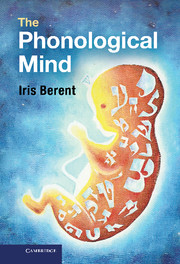Crossref Citations
This Book has been
cited by the following publications. This list is generated based on data provided by Crossref.
Sandler, Wendy
2012.
The Phonological Organization of Sign Languages.
Language and Linguistics Compass,
Vol. 6,
Issue. 3,
p.
162.
Berent, Iris
Vaknin-Nusbaum, Vered
Balaban, Evan
and
Galaburda, Albert M.
2013.
Phonological generalizations in dyslexia: The phonological grammar may not be impaired.
Cognitive Neuropsychology,
Vol. 30,
Issue. 5,
p.
285.
Berent, Iris
Dupuis, Amanda
Brentari, Diane
and
Pinker, Steven
2013.
Amodal Aspects of Linguistic Design.
PLoS ONE,
Vol. 8,
Issue. 4,
p.
e60617.
Gómez, David Maximiliano
Berent, Iris
Benavides-Varela, Silvia
Bion, Ricardo A. H.
Cattarossi, Luigi
Nespor, Marina
and
Mehler, Jacques
2014.
Language universals at birth.
Proceedings of the National Academy of Sciences,
Vol. 111,
Issue. 16,
p.
5837.
Gow, David W.
Nied, A. Conrad
and
Snyder, Joel
2014.
Rules from Words: A Dynamic Neural Basis for a Lawful Linguistic Process.
PLoS ONE,
Vol. 9,
Issue. 1,
p.
e86212.
Berent, Iris
Dupuis, Amanda
and
Brentari, Diane
2014.
Phonological reduplication in sign language: Rules rule.
Frontiers in Psychology,
Vol. 5,
Issue. ,
Berent, Iris
Pan, Hong
Zhao, Xu
Epstein, Jane
Bennett, Monica L.
Deshpande, Vibhas
Seethamraju, Ravi Teja
Stern, Emily
and
Berwick, Robert C.
2014.
Language Universals Engage Broca's Area.
PLoS ONE,
Vol. 9,
Issue. 4,
p.
e95155.
Lennertz, Tracy
and
Berent, Iris
2015.
On the sonority levels of fricatives and stops.
The Mental Lexicon,
Vol. 10,
Issue. 1,
p.
88.
Everett, Daniel L.
2016.
An Evaluation of Universal Grammar and the Phonological Mind1.
Frontiers in Psychology,
Vol. 7,
Issue. ,
Pennisi, Antonino
and
Falzone, Alessandra
2016.
Darwinian Biolinguistics.
Vol. 12,
Issue. ,
p.
31.
Rosselló Ximenes, Joana
2016.
Biolinguistic Investigations on the Language Faculty.
Vol. 235,
Issue. ,
p.
55.
Berent, Iris
2016.
Commentary: “An Evaluation of Universal Grammar and the Phonological Mind”—UG Is Still a Viable Hypothesis.
Frontiers in Psychology,
Vol. 7,
Issue. ,
Berent, Iris
2017.
Is markedness a confused concept?.
Cognitive Neuropsychology,
Vol. 34,
Issue. 7-8,
p.
493.
Parker, Steve
2017.
Sounding out Sonority.
Language and Linguistics Compass,
Vol. 11,
Issue. 9,
Romani, Cristina
Galuzzi, Claudia
Guariglia, Cecilia
and
Goslin, Jeremy
2017.
Comparing phoneme frequency, age of acquisition, and loss in aphasia: Implications for phonological universals.
Cognitive Neuropsychology,
Vol. 34,
Issue. 7-8,
p.
449.
van Oostendorp, Marc
2017.
Crossroads Semantics.
p.
193.
Berent, Iris
2017.
On the Origins of Phonology.
Current Directions in Psychological Science,
Vol. 26,
Issue. 2,
p.
132.
Lidz, Jeffrey
and
Dudley, Rachel
2017.
Evaluation measures and the study of language acquisition.
Language Acquisition,
Vol. 24,
Issue. 2,
p.
81.
Blevins, Juliette
and
Egurtzegi, Ander
2017.
Unexpected obstruent loss in initial obstruent–sonorant clusters: an apparent example from Basque.
Phonology,
Vol. 34,
Issue. 3,
p.
507.
Sandler, Wendy
2017.
The Challenge of Sign Language Phonology.
Annual Review of Linguistics,
Vol. 3,
Issue. 1,
p.
43.



